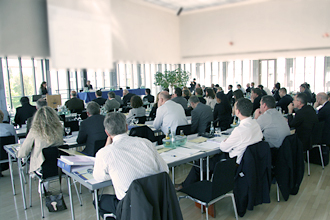
Conference: Crime victims’ access to justice in the European Union

On the 18th and 19th of April the Academy of European Law organised in Trier a conference on the topic of crime victims’ access to justice in the European Union (EU).
The seminar focused on the analysis and discussion of the new Directive of the European Parliament and of the Council establishing minimum standards on the rights, support and protection of victims of crime and on the mutual recognition systems for protection measures within the EU.
The seminar was enriched by the active participation of several judicial practitioners and jurists of victim support organisations from various European countries: France, Belgium, Romania, Spain and Portugal.
The Victim Support Europe Annual Conference 2013 | May 29th – June 1st | Edinburgh
The Victim Support Europe Annual Conference 2013, “Supporting Victims of Crime in Europe”, is going to take place between May 29 and June 1 in Edinburgh, Scotland.
This event will bring together criminal justice professionals, EU Members States representatives, academics, policymakers and victim support practitioners to discuss new developments and best practice in relation to victims of crime in Europe.
It will also host a discussion and debate about the implementation of the EU directive on victim’s rights and steps to ensure successful delivery, the rights of victims of crime, the impact of human trafficking, cross-border victimisation and ways of effectively delivering services to victims of crime.
The event will include speakers from the European Parliament, the Irish EU Presidency, Justice Ministries and other international experts in the field of justice and victim’s rights.
To find out more about registration, programme and practical information, visit the conference website:
APAV launches the campaign “Your Safety is not a Game. Stay Connected.”
Between 2000 and 2011, APAV processed 7,387 cases of children and youth victims of crime and violence, which altogether amount to 11,261 crimes committed against children. Among these cases, crimes against property became the third most frequent, but were relatively low when compared to crimes committed against persons. This fact is indicated by the low level of complains and requests for help from younger people when it comes to crimes of this nature.
 To address these problems, APAV sought to produce and disseminate to a younger audience easy-to-follow information and resources on violence. The resources will also touch on the importance of reaching out for help and assistance, and on ways to adopt personal safety and protection measures.
To address these problems, APAV sought to produce and disseminate to a younger audience easy-to-follow information and resources on violence. The resources will also touch on the importance of reaching out for help and assistance, and on ways to adopt personal safety and protection measures.
So with the help of Ideias com Pernas, APAV developed the educational and awareness-raising campaign website, www.apavparajovens.pt. Sponsored by Cupido, this campaign is also fortunate enough to have young actors Mikaela Lupu and Ricardo Sá involved to help deliver an important message to a younger audience: “Your Safety is not a Game. Stay Connected”. This project draws attention to the possible dangers that one might encounter when walking on the streets, teaching younger audiences how to adopt personal safety and protection measures.
The dissemination of this project has begun since December 2012, with joint efforts from Master’s and PhD’s students, public and private secondary schools, Facebook networks, partner institutions and mass media. Partner organizations in Scotland and Sweden also provided tremendous help and support in disseminating the message to the targeted audience.
This initiative is done under Project LEAD – Inform to Prevent, which was promoted by APAV and financially supported by the Directorate-General Justice of the European Commission. All of this is made possible under the programme DAPHNE III, involving national partners, the Foundation of Youth, ISCTE (Instituto Universitário de Lisboa), as well as international partners – namely, Victim Support Scotland (Scotland) and Crime Victim Compensation and Support Authority (Sweden).
APAV receives congratulations on action against Stalking

APAV received a warm congratulation for joining the UK on the National Stalking Awareness Day on April 18th, which was officially launched last year by Scotland and England and Wales.
Hence, APAV launches this year its first National Stalking Awareness Day and will do so by launching a leaflet and a website on the phenomenon [www.apav.pt/stalking]. Hopefully this will be a key opportunity to raise the awareness to this form of victimisation that is not yet recognized has a crime in Portugal.
Our slogan is "Take stalking seriously" ("Levar o stalking a sério") and we aim to raise the awareness of the general public for the negative and sometimes life threatening consequences of stalking for its victims.
P3 [Público]: “Dating Violence: Young People Less Likely to File a Complaint”

"A study has shown that young people are more aware of dating violence, but still only nine percent of victims file a complaint to the authorities.
“Young people are more aware of dating violence, but still very few request help and only nine percent of victims file a complaint to the authorities,” said researcher Sónia Caridade.
“Dating violence is characterised by feelings of shame and embarrassment, and a great majority of youth are not seeking help,” said the author of the study on this subject.
The fear of being blamed, of not being able to keep the situation a secret, of having the adults pressure them into ending the relationship, of not receiving the help needed, and of parental punishments (since many relationships are not allowed by parents) makes young people hesitate in telling others what they are going through.
Friends are the main confidants
“Their main confidants are usually friends, but a majority are not equipped to give adequate support. They themselves might also be involved in abusive relationships, or they legitimise a set of beliefs that perpetuate the phenomenon,” explained a researcher at the Universidade do Minho, when speaking about the purpose of Valentine’s Day.
To raise awareness among young people about this problem, the Portuguese Association for Victim Support (APAV) has conducted campaigns to address the importance of recognising all acts of violence as behaviors that are punishable by law.
“It is fundamental to invest in these young people to raise awareness and foster in them a proactive attitude whenever these situations arise,” said Manuela Santos from APAV.
The decision of a young person to file a complaint or expose this experience to a police officer is not easy to make, usually preferring to go to an institution of support. “APAV receives some requests for help from young people who would share with us their experiences of victimisation and ask us for support and referrals about what they can do from a legal standpoint,” said Santos, adding that these requests have been growing.
For researcher Susan Lucas from the Piaget Institute, prevention campaigns have contributed to a shift in paradigm where dating violence does not have to be “something hidden and have shown people that they are not alone”. “Fortunately there is already a demand [from young people] for the authorities and associations to support the victim, who comes forward to them to go through proper legal procedures,” said Lucas, adding that abuse begins around 13 years of age.
The frequency of violence is “higher” among youth with less education and among boys who are taught to be stronger, emotionally inhibited, competitive and domineering with their partners. A culture of prevention involving the promotion of healthy relationships, young people’s awareness and modification of violent behavior is, according to Caridade, the best way to combat dating violence. For this to happen, there must be a concerted effort among young people, institutions, organisations, educational providers (parents, teachers, and staff), peers and the community."
Source: P3 [Público]











